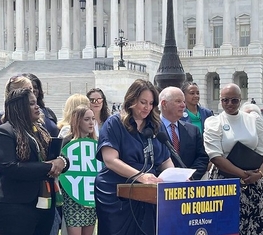Planned Parenthood of Arizona v. Mayes
Case Summary
LWV Arizona and several business owners filed an amicus brief in the Arizona Supreme Court urging the court to not revive an 1864 abortion ban. Dr. Eric Hazelrigg, an anti-abortion OB-GYN, sought to revive the ban, alleging the law overrode a 2022 law allowing abortions up to 15 weeks.
In 1864, Arizona, then a territory of the United States, enacted a near-total abortion ban, permitting the procedure only when necessary to save the mother’s life (“1864 ban”). This ban, which was never formally repealed, remains codified in Arizona state law, and states:
"A person who provides, supplies or administers to a pregnant woman, or procures such woman to take any medicine, drugs or substance, or uses or employs any instrument or other means whatever, with intent thereby to procure the miscarriage of such woman, unless it is necessary to save her life, shall be punished by imprisonment in the state prison for not less than two years nor more than five years."
A.R.S. § 13-3603
In 1973, the United States Supreme Court ruled in Roe v. Wade that abortion was a right protected by the federal constitution, rendering the 1864 ban unenforceable.
In 2022, the Arizona Legislature enacted a ban on abortions after fifteen weeks of pregnancy, with an exception for medical emergencies (“15-week ban”). The 15-week ban states,
“A. Except in a medical emergency, a physician may not perform, induce or attempt to perform or induce an abortion unless the physician or the referring physician has first made a determination of the probable gestational age of the unborn human being and documented that gestational age in the maternal patient's chart and, if required, in a report required to be filed with the department as set forth in subsection C of this section. The determination of probable gestational age shall be made according to standard medical practices and techniques used in the medical community.
B. Except in a medical emergency, a physician may not intentionally or knowingly perform, induce or attempt to perform or induce an abortion if the probable gestational age of the unborn human being has been determined to be greater than fifteen weeks.”
A.R.S. § 36-2322(A)-(B)
In 2022, the United States Supreme Court reversed itself in Dobbs, removing abortion from federal protection and leaving states to decide whether to guarantee reproductive freedom.
Soon afterward, then-Arizona Attorney General Mark Brnovich requested a state court issue a ruling reinstating the 1864 ban. Planned Parenthood Arizona and the Pima County Attorney’s Office opposed the request. The state court subsequently ruled in favor of the Attorney General, declaring the 1864 ban in effect and appointing Dr. Hazelrigg guardian ad litem of Arizona’s unborn children. This ruling was subsequently overturned on December 30, 2022, by the Arizona Court of Appeals, which harmonized the two abortion bans, ruling the 1864 ban applied to persons who were not doctors performing abortions, but that the fifteen-week ban passed in 2022 allowed doctors to perform abortions until fifteen weeks of pregnancy. The court stated that ruling the 1864 ban overrode the 15-week ban would violate the legislature’s intent to regulate and allow abortions up to that time and create an irreconcilable conflict between two sets of laws. The court's opinion also pointed to due process concerns, as one abortion ban could criminalize conduct allowed by another, leading to confusion among doctors about which law to follow and potential prosecution.
Dr. Hazelrigg appealed to the Arizona Supreme Court, asking it to overturn the court of appeals’ decision and declare the 1864 ban to be the controlling law. On August 23, 2023, the Arizona Supreme Court agreed to hear the appeal.
On October 4, 2023, LWV Arizona and fifteen business owners filed an amicus brief urging the court to uphold the court of appeals’ decision. The brief emphasized that the 1864 ban was enacted when women had no right to vote, and by extension, no right to influence laws regulating their bodies and freedom. The brief also pointed out that women living in states with abortion bans suffered from lower living standards and inequality, and that reinstating the 1864 ban would hurt Arizona’s continued ability to grow and prosper.
LWV Arizona was represented in this matter by Papetti Samuels Weiss McKirgan LLP.
LWV Timeline
United States Supreme Court overturns Roe v. Wade
In a 5-4 decision, the Supreme Court overrules Roe v. Wade, ruling that abortion is not protected by the federal constitution.
Arizona Attorney General Mark Brnovich requests a court reinstate the 1864 abortion ban
Arizona Attorney General Mark Brnovich files a motion in the Pima County Superior Court, asking it to lift a 1973 injunction preventing enforcement of the 1864 ban, allowing the state to ban abortion again.
State trial court reinstates 1864 abortion ban
The court grants the Attorney General’s motion, lifting the 1973 injunction and reinstating the 1864 abortion ban. The court also appoints Dr. Eric Hazelrigg as guardian ad litem of all unborn children in Arizona, allowing him to represent their interests before the court.
Arizona Court of Appeals reverses trial court
The Arizona Court of Appeals overrules the trial court, stating the 1864 ban and 15-week ban are not conflicting, and that physicians may perform abortions up to 15 weeks of gestational age.
Dr. Hazelrigg appeals
Dr. Hazelrigg petitions for review in the Arizona Supreme Court, arguing the court of appeals’ decision should be reversed, and that the 1864 ban should be reinstated.
Arizona Supreme Court accepts appeal
LWV Arizona files amicus brief
LWV Arizona and 15 allied business owners file an amicus brief with the Arizona Supreme Court, arguing reinstatement of the 1864 ban is undemocratic and destructive of Arizona’s economy.





